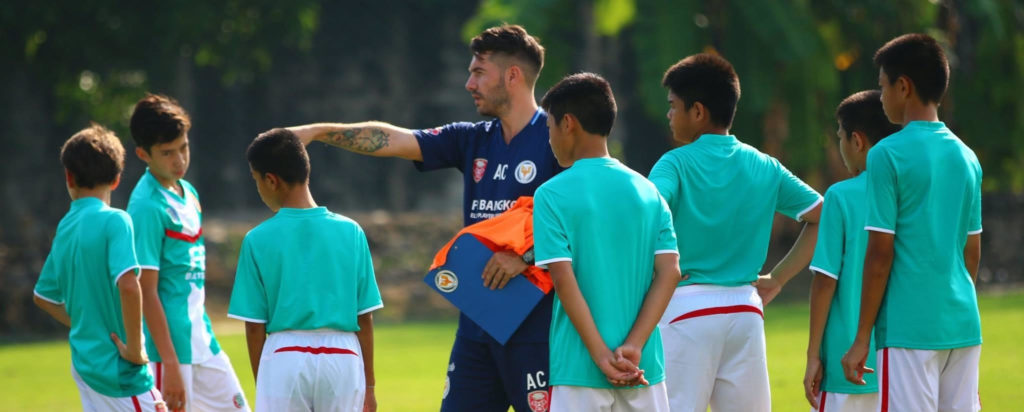Moving abroad to follow a chosen career path can be an intimidating and scary process for most people. New countries bring with them new and unknown challenges but hidden within these professional and social challenges comes opportunity.
I’ve been in Thailand for 8 years now and each new year at FC Bangkok presents a fresh list of challenges, Covid-19 being the most current. Challenges and setbacks are really what has made me a more confident and capable academy director and business owner. So, as I write this, it’s not to scare people from moving. On the contrary, I couldn’t promote moving abroad more. If coaching abroad is something you are planning, it is essential to be prepared for some of these challenges.
Learn the Lingo:
First and foremost is language. Growing up, I never respected the importance and real benefit of a foreign language. Despite the majority of my club coaching bein in English, not knowing Thai as well as I should proves to be the biggest difficulty in my day to day, personal and professional life. Learning a language is extremely time-consuming and difficult (especially Thai with its multiple tones) and it’s unlikely you will be fluent in the time you wish to be. However, your assistant coaches and staff will respect the fact your trying and respecting their culture.
Not speaking the language is a challenge, so I’ve had to find solutions to give player feedback and coaching advice. Use of video is massive in the modern game and when you’re working abroad it’s a must.
Advice – Coaches should collect their own database of clips to show players or coaches what they are looking for before, during and after training and games.

Mental Strength
Moving from the comforts of home is easy when you’re on the field and coaching, life is great if you’re on a football pitch regardless of what country you’re in. But the big challenge is how you deal with being alone off of the football pitch (especially when you first move). It’s a mental test and can be character building if you choose to use the time wisely – study the language, write coaching blogs, visit other football clubs and networking to name a few.
Being alone for a lot of time tends to lead to overworking simply to stay active and busy and yes, it’s important to work hard and dedicate yourself to the new club, especially in the early stages but don’t move across the world and become a slave to the job. Experience new countries off the field by joining teams, clubs or groups. Balance is key.
Set your own standards
You have probably been hired based on a coaching CV and maybe some video interviews but realistically they won’t have seen your work ethic and standards of coaching. It’s a gamble for your employer and they want to see you bring value to their club. Think of the attitude, preparation and efforts you would make if a premier league club like Liverpool wanted to hire you; the prospect of working with elite players, coaching at world-class facilities and using the best equipment is enough to make any coach excited. The reality is you may just experience the total opposite on your journey. But it’s how you react and adapt to this challenge that will separate the coaches who are given bigger and better opportunities abroad from the coaches who end up going home.
I’ve seen good coaches arrive in Asia who recognize the change of infrastructure – the player standard is lower, coaching standards are less than what they are used to, and facilities are non-desirable. Over time the coaches attitude change for the worse, showing less effort and work ethic because they feel their qualities are enough to get by doing bare minimum. I’ve been guilty of getting lazy or unmotivated at times – using the same session plan or giving basic and general player feedback but I realized early that I’m cheating, not only the players but myself as a coach who is always learning.
Use every session to improve players, the club and yourself as a coach. And ask yourself if you would have done that same session at Liverpool.

Student of the game:
Moving abroad is usually for a full-time position, something that isn’t readily available in the UK. Being on the grass every day will make you a better coach but as I mentioned above, it’s very likely you will be the most qualified and experienced coach in your new club. This can often leave you without the peers and mentors you may have had at home. One thing I miss from professional academy football is the ability to watch other sessions and get new session ideas or simply see an activity coached using different methods. When you move abroad, this professional network is left behind, and coaches will be watching you for notes and ideas.
So how do you keep up to date for your own personal development as well as the players?
Building a professional network of coaches here in Thailand has been challenging for many reasons, including what I have shared above, so I adapted and used the following for my continued professional growth:
- Podcasts
- Coaching websites
- Twitter/ Social Media
- Online Coaching Certificates and licenses.
Another huge impact in my personal development has been keeping up to date with my UEFA licenses. Each year I go back home, I try to book my flight at the same time a course is running. You may be thinking that these costs add up and you’re correct.
But my final piece of advice is, invest in yourself. It’s not wasting money if it makes you better at what you do.





